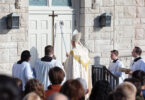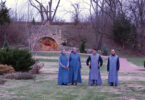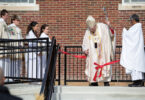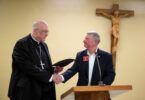by Joe Bollig
joe.bollig@theleaven.org
TOPEKA — Now with the session entering the home stretch, the only decisions faced by the Kansas Legislature are difficult ones.
“The elephant in the room this year is the budget,” said Michael Schuttloffel, executive director of the Kansas Catholic Conference. “We have a budget crisis in the state right now, like almost all other states.”
The decisions being made to address the state’s budget shortfall will be difficult, and the conference is tasked with the tough job of fighting for the poor and vulnerable.
“The Catholic Church is not just another political interest group presenting a list of funding demands,” said Schuttloffel. “We put forward a set of moral principles to guide legislators, who have to make difficult decisions. We ask that they not balance the budget on the backs of the most vulnerable. Not every budget cut is equal — or equally painful.”
The conference asks for special consideration and funding priority to the most vulnerable, such as the disabled.
Another vulnerable population is low-income women who are pregnant. This past summer, Gov. Mark Parkinson cut off funding to the Stan Clark Pregnancy Maintenance Initiative, which helped these women. Although the governor justified this as a budget cut necessity, he later used his line-item veto power to block legislation that cut funding for Planned Parenthood.
“We believe there is a special claim on the consciences of Catholics in regard to the life issues,” said Schuttloffel. “And so, we make that a special priority, and that’s a challenge, given we don’t have leadership on those issues in the governor’s office that’s supportive of our goals.”
There was also legislation in the House that would have required that private insurance companies not include abortion as part of their standard coverage. Those who wanted abortion coverage would have to pay for a separate rider.
“Unbeknownst to many Kansans and employers who provide health insurance as an employment benefit, many [private] health insurance plans in the state include abortion as part of their routine coverage,” said Schuttloffel. “Many Kansans are unknowingly paying for abortions with their health insurance premiums.”
This became an amendment to another bill and it was passed. Unfortunately, this legislation was scuttled when pro-abortion legislators added “poison pill” amendments.
“We were pleased to see that a majority of the members of the House agreed that this policy needs to be changed,” he said. “We are disappointed about the outcome — that the overall bill was not able to move forward because of the poison pill added by opponents of pro-life legislation. We’re hopeful that before all is said and done, there will be another opportunity to look at that issue.”
In terms of other pro-life legislation, the conference supports a bill that requires doctors to give a specific diagnosis for abortions on late-term, viable unborn children. Similar legislation was vetoed by the governor last year, and an override effort failed.
“In Kansas, you’re only allowed to perform a late-term abortion — after the unborn baby is viable, roughly 23 weeks — if there is grave risk to the mother,” said Schuttloffel.
“Abortionists are supposed to provide a reason so the state can ensure that the law is being upheld,” he continued. “However, one of the many ways abortionists get around this is [by regurgitating] back to the state agencies the language of the law. What we want is a specific medical diagnosis.”
New, streamlined legislation — House Bill 2115 — requiring a specific diagnosis has been introduced this year, and Schuttloffel hopes it will be given consideration before the session ends.
The conference also gave its support to efforts to repeal the death penalty in Kansas. Bishop Michael Jackels of the Diocese of Wichita testified in favor of a bill, which passed out of committee and went to the Senate floor for a robust debate. The vote on the bill was just one tally short.
“We are thrilled the Senate took the issue seriously and gave it the sober consideration it deserved,” said Schuttloffel. “We are disappointed with the final outcome, but pleased with the seriousness of the debate. Frankly, there were many folks who didn’t think we would get 20 votes. So, we were pleasantly surprised that we got as many votes as we did, and I think it bodes well for the future.”
Last month, Archbishop Joseph F. Naumann and Bishop Paul Coakley of the Diocese of Salina went to Topeka for their annual visit to leaders of the state government. On Feb. 1, they met with the governor and legislative leaders. On Feb. 2, they met with Catholic legislators. The bishops celebrated Mass at Assumption Parish and later had breakfast with the legislators.
The 2009-2010 Kansas legislative session concludes May 5.






